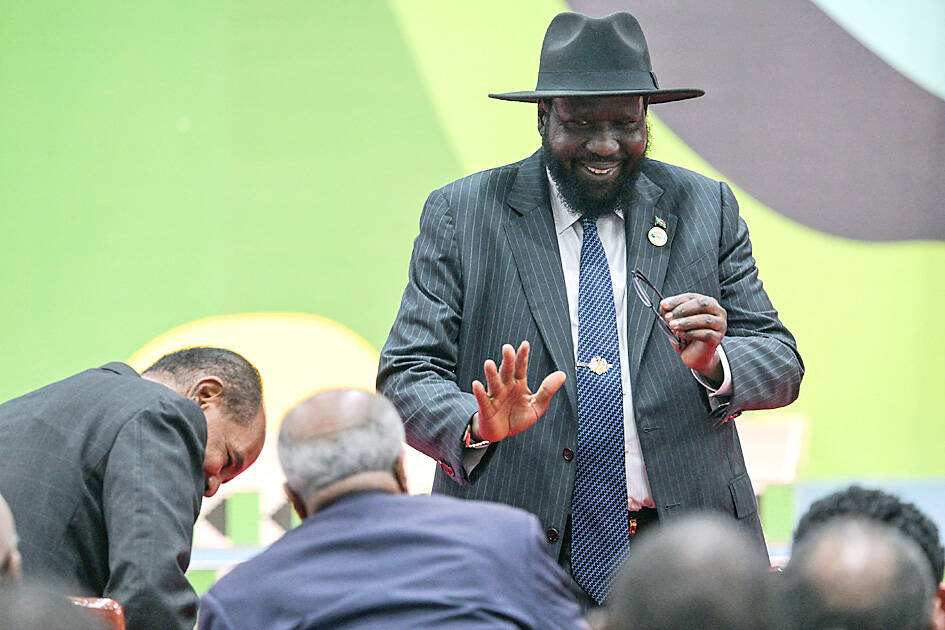Hundreds of thousands of South Sudanese refugees fleeing Sudan’s brutal war are facing “a hunger emergency,” the UN warned yesterday, with 90 percent of families going multiple days without meals.
The fighting between forces loyal to Sudanese Lieutenant-General Abdel Fattah al-Burhan and Mohamed Hamdan Daglo, commander of the Rapid Support Forces has forced nearly 300,000 people to return home in the past five months, the UN’s World Food Programme said.
The crisis was taking a particularly harsh toll on the youngest people, with 20 percent of children under the age of five malnourished, the agency said.

Photo: AFP
“We are seeing families leave one disaster for another as they flee danger in Sudan only to find despair in South Sudan,” said Mary-Ellen McGroarty, the World Food Programme’s country director in Juba.
Since fighting erupted in Sudan in the middle of April, at least 7,500 people have lost their lives, an estimate by the Armed Conflict Location & Event Data Project showed.
Multiple truces have failed to stop the violence that has driven tens of thousands over Sudan’s borders and raised fears of a humanitarian crisis engulfing the wider region.
The World Food Programme said that South Sudanese, who account for almost all the refugees arriving in South Sudan, “are returning to a country already facing unprecedented humanitarian needs.”
“Those arriving today are in an even more vulnerable condition than families that fled in the early weeks of the conflict,” it said
Torrential rains pummeling crowded camps and border crossings have worsened living conditions and exacerbated the spread of diseases, it said.
Meanwhile, South Sudanese President Salva Kiir has sacked central bank governor Johnny Ohisa Damian and other senior finance officials, state television announced on Monday.
The announcement did not say why Kiir was removing Damian and appointing James Alic Garang, an adviser to the IMF, in his place.
Kiir also replaced the central bank’s two deputy governors, the head of the government’s revenue authority and other senior officials in the finance and trade ministries.
Abrupt changes to the leadership of the central bank and finance ministry have been frequent in recent years, and in 2020 alone the central bank governor was replaced twice.
Damian only took up the position in August last year after Moses Makur Deng was removed from the role.
South Sudan’s economy has been depressed since the civil war erupted in 2013, forcing about one-quarter of its population to flee the nation.

DEFENDING DEMOCRACY: Taiwan shares the same values as those that fought in WWII, and nations must unite to halt the expansion of a new authoritarian bloc, Lai said The government yesterday held a commemoration ceremony for Victory in Europe (V-E) Day, joining the rest of the world for the first time to mark the anniversary of the end of World War II in Europe. Taiwan honoring V-E Day signifies “our growing connections with the international community,” President William Lai (賴清德) said at a reception in Taipei on the 80th anniversary of V-E Day. One of the major lessons of World War II is that “authoritarianism and aggression lead only to slaughter, tragedy and greater inequality,” Lai said. Even more importantly, the war also taught people that “those who cherish peace cannot

STEADFAST FRIEND: The bills encourage increased Taiwan-US engagement and address China’s distortion of UN Resolution 2758 to isolate Taiwan internationally The Presidential Office yesterday thanked the US House of Representatives for unanimously passing two Taiwan-related bills highlighting its solid support for Taiwan’s democracy and global participation, and for deepening bilateral relations. One of the bills, the Taiwan Assurance Implementation Act, requires the US Department of State to periodically review its guidelines for engagement with Taiwan, and report to the US Congress on the guidelines and plans to lift self-imposed limitations on US-Taiwan engagement. The other bill is the Taiwan International Solidarity Act, which clarifies that UN Resolution 2758 does not address the issue of the representation of Taiwan or its people in

US Indo-Pacific Commander Admiral Samuel Paparo on Friday expressed concern over the rate at which China is diversifying its military exercises, the Financial Times (FT) reported on Saturday. “The rates of change on the depth and breadth of their exercises is the one non-linear effect that I’ve seen in the last year that wakes me up at night or keeps me up at night,” Paparo was quoted by FT as saying while attending the annual Sedona Forum at the McCain Institute in Arizona. Paparo also expressed concern over the speed with which China was expanding its military. While the US

‘FALLACY’: Xi’s assertions that Taiwan was given to the PRC after WWII confused right and wrong, and were contrary to the facts, the Ministry of Foreign Affairs said The Ministry of Foreign Affairs yesterday called Chinese President Xi Jinping’s (習近平) claim that China historically has sovereignty over Taiwan “deceptive” and “contrary to the facts.” In an article published on Wednesday in the Russian state-run Rossiyskaya Gazeta, Xi said that this year not only marks 80 years since the end of World War II and the founding of the UN, but also “Taiwan’s restoration to China.” “A series of instruments with legal effect under international law, including the Cairo Declaration and the Potsdam Declaration have affirmed China’s sovereignty over Taiwan,” Xi wrote. “The historical and legal fact” of these documents, as well